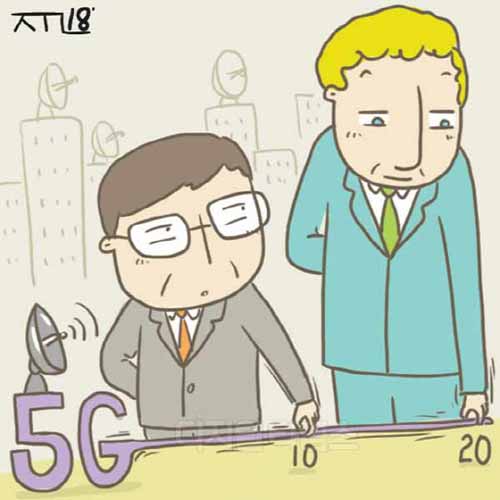Even 20 year short for Europe, up to 10 years for Korea… ‘Issue’ in frequency allocation period
Jong Ye Lin | yeslin@ | 2018-03-20 11:29:20

Although the Ministry of Science and Technology and the Ministry of Information and Communication plan to take five to 10 years in the 5G frequency allocation period, there is a voice saying that the 5G allocation period should be increased like Europe set in 20 years.
According to the Ministry of Information and Communication (MIC) on March 19, the allocation period of the 5G frequency to be allocated in the June auction will be set between 5 and 10 years. The Ministry of Information and Communication has already set the allocation period to 10 years at the previous frequency auction. However, it has been adjusted to 5 years or 8 years considering the end of allocation of adjacent band frequencies.
On the other hand, the European Union will finalize the frequency allocation period with each member country in June, and announced the allocation period to 20 years in the "5G Frequency Allocation Report" announced last year. In particular, the EU proposes 10 recommendations for each country and expects that the longer the licensing period and the lower the auction price, the higher the investment in the service.
Meanwhile, the European Union has said it will allocate 5G frequencies for up to 20 years, but it is rebelling against European carriers. The European Telecommunications Operators Association (ENTO), which includes Europe, the largest mobile operator in Europe, including telephony and telecom Italia, is asking for 25 years to extend its service life by five more years.
In this way, European telcos respond sensitively to the 5G frequency allocation period because the investment cost is enormous due to the characteristics of ultra-high 5G frequency. If the allocation period is short, there is a disadvantage that the operator cannot see the investment decision on the frequency in the long term. In 2016, the European Commission has announced that it will extend the frequency lending period from the current minimum of 10 years to a minimum of 25 years to eliminate the investment uncertainty of telcos. However, when the 25 years are shortened to 20 years again, the carriers are rebelling.
Therefore, it is pointed out that it is necessary to increase the allocation period of 5G frequencies in Korea, which is mainly auctioned in June. It is an intention to invest in a stable investment as the investment cost is high. This is due to the fact that if the allocation period is long, the frequency band to be paid at once may fall and the burden of short-term investment may be reduced.
An agency expert said, "If the allocation period is short, there will be a burden of competition for the bleeding through the auction every time it ends."
Not only that. It takes about one year to build a nationwide network with allocated frequency bands. However, it is better to set up a long-term investment plan for the frequency as it invests steadily through frequency bundling technology (CA) after the construction.
However, the Ministry of Information and Communication (MIC) of the Ministry of Finance and Economy (MIC) has a negative stance on such opinions.
The Ministry of Information and Communication said that if additional frequency is needed, it can be reallocated as much as possible.
According to the Ministry of Information and Communication, an official of the Ministry of Information and Communication said, "Due to the rapidly changing market conditions, it is not appropriate for the frequency to be longer than the first assignment when the allocation period ends. "He said.
By Jong Ye Lin yeslin@
